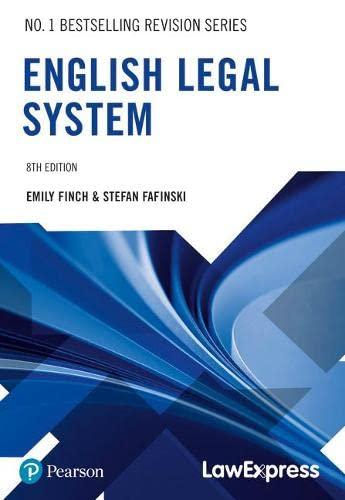Question
Case 1 Innovative Marketing, Inc. (IMI) sold scarewarecomputer security software. IMI's Internet ads redirected consumers to sites where they were told that a scan of
Case 1
Innovative Marketing, Inc. (IMI) sold "scareware"computer security software. IMI's Internet ads redirected consumers to sites where they were told that a scan of their computers had detected dangerous filesviruses, spyware, and "illegal" pornography. No scans were conducted. Kristy Ross, an IMI co-founder, and vice president, reviewed and edited the ads and was aware of the many complaints that consumers had made about them. An individual can be held liable under the Federal Trade Commission Act's prohibition of deceptive acts or practices if (1) participated directly in the deceptive practices or had the authority to control them and (2) had or should have had knowledge of them. (374, Miller)
- Were IMI's ads deceptive? If so, can Ross be held liable? Explain. [Federal Trade Commission v. Ross, 743 F.3d 886 (4th Cor. 2014)]
Case 2
Barry Sussman graduated from law school and served time in prison to collect debts by posing as an FBI agent. He theorized that if a debt-collection business collected only debts that it owned due to buying checks written on accounts with insufficient funds (NSF checks), it would not be subject to the Federal Debt Collection Practices Act (FDCPA). Sussman formed Check Investors, Inc., to act on his theory. Check Investors bought more than 2.2 million NSF checks for pennies on the dollar with an estimatedface value of about $348 million. Check Investors added a fee of $125 or $130 (more than the legal limit in most states) to the face amount of each check and aggressively pursued its drawer to collect. The firm's employees were told to accuse drawers of being criminals and threaten them with arrest and prosecution. The threats were false. Check Investors never took steps to initiate a trial. The employees contacted the drawers' family members and used "saturation phoning"phoning a drawer numerous times in a short period. They used abusive language, referring to drawers as "deadbeats," "retards," "thieves," and "idiots." Between January 2000 and January 2003, Check Investors netted more than $10.2 million from its efforts. [Federal Trade Commission v. Check Investors, Inc.,
- The Federal Trade Commission filed a suit in a federal district court against Check Investors and others, alleging, in part, violations of the FDCPA. For example, was Check Investors a "debt collector," collecting "debts," within the meaning of the FDCPA? If so, did its methods violate the FDCPA? Were its practices unethical? What might Check Investors argue in its defense?
- Are "deadbeats" the primary beneficiaries of laws such as the FDCPA? If not, how would you characterize debtors who default on their obligations?
Step by Step Solution
There are 3 Steps involved in it
Step: 1

Get Instant Access to Expert-Tailored Solutions
See step-by-step solutions with expert insights and AI powered tools for academic success
Step: 2

Step: 3

Ace Your Homework with AI
Get the answers you need in no time with our AI-driven, step-by-step assistance
Get Started


